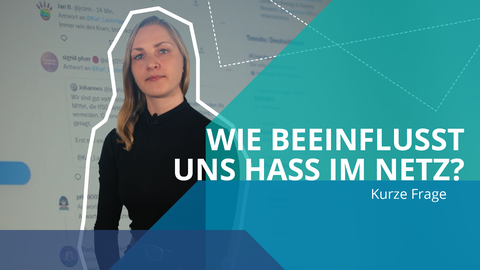Jan 30, 2023
Why is social media such a breeding ground for hate speech?
Communications expert Anna Sophie Kümpel explains why it’s important to reply to malevolent comments
Increased visibility of debates, user anonymity, and the algorithm for recommended content – these are just some reasons why hate speech is spread so easily online. In a new episode from the TUD video series “Kurze Frage” (“Quick question”), Jun.-Prof. Anna Sophie Kümpel, researcher in media and communication, discusses the consequences of hate speech and explains what we can do to combat it.
An Antisemitism Commissioner sued Twitter because he was confronted with unobstructed hatred on the platform. YouTuber Drachenlord’s house was besieged by their haters. And the state of Lower Saxony is hiring additional staff for its own Central Office for Hate Crimes because there is always more work to be done in this area. These are just some of the news stories from the past few weeks that pop up if you search for “hate speech.” Insults and threats are omnipresent on the web. According to a current study conducted by the Media Authority of North Rhine-Westphalia, 36 percent of internet users in Germany report seeing hateful comments on social media frequently or very frequently. This figure has grown substantially over the past several years.
Why do we keep seeing more hate speech online? The first key reason is increased visibility of debates on social media or in the comments section of news sites, explains Junior Professor Anna Sophie Kümpel from TU Dresden’s Institute of Media and Communication. “I can see how people talk about current topics and events, and their discourse is often very emotional or hateful.” Moreover, negative, emotional and polarizing content in particular receives a lot of attention on Facebook, Twitter and the like – one the one hand because users share this content, and on the other because the algorithm for recommended content displays it. Plus, anonymity and not being able to see who you’re talking to make it easier to spread hate. “You don’t have the social cues that would normally alert you to be friendlier. Therefore, it’s easier to be insulting on social media.” But it’s not just the platforms that are at fault. Individual motives and personality traits facilitate offensive speech. Anyone who feels attacked personally or in their point of view is quicker to become abusive.
“Hate, of course, has a harmful impact in many different ways, both for the person directly affected and for society.” People confronted with hate on social media may be motivated to remove themselves from the political discourse as a consequence. In the long term, this threatens the plurality of opinions online. “We already know that malicious user comments on journalistic articles discount their credibility and thus contribute to a general loss of trust in the media.”
That’s why, according to Anna Sophie Kümpel, responding to virulent comments is an important tool for opposing hate on social media. Other effective countermeasures include the active community management of the platforms themselves as well as reporting and even filing charges against online hate speech. She adds, “Teaching media literacy to young people in particular is essential so that they can identify and deal with animosity.”
Watch the video: https://youtu.be/v5R_zUKdXko (Please note: The video is currently only available in German.)
Anna Sophie Kümpel’s website: https://anna-kuempel.de


